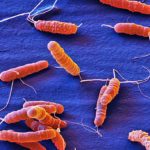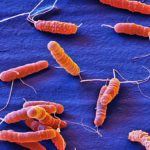Link to Pubmed [PMID] – 20709622
Mutat. Res. 2010 Nov;703(1):66-70
More and more convincing data link bacteria to the development of cancers. How bacteria act as mutagens by altering host genomes, what are the different strategies they develop and what consequences do they have on infection-associated pathogenesis are the main questions addressed in this review, which focuses in particular on Helicobacter pylori infection. H. pylori is a major risk factor for gastric cancer development. Its oncogenic role is mediated by the chronic active inflammation it elicits in the gastric mucosa, associated with its capacity to persistently colonize the human stomach. However, direct genotoxicity of H. pylori through the action of bacterial cytotoxin or resulting from a DNA damaging effect of its metabolic derivatives as nitroso compounds cannot be excluded. Numerous studies have investigated inflammation-associated DNA damaging activity and mutagenic response due to H. pylori infection in both human and animal models. Recent findings on its mutagenic effects at the nuclear and mitochondrial genome and related DNA damage are reviewed. This genotoxic activity associated with oxidative species produced during inflammation is linked to the decreased efficiency of DNA repair systems. DNA methylation, which plays an important role in the regulation of the host response to H. pylori infection, is also documented. Furthermore, H. pylori affects genome integrity by increasing activation-induced cytidine deaminase (AID), a DNA/RNA editing cytidine deaminase linking mutagenesis and tumorigenesis. These different strategies occurring during bacteria-host cell interaction, lead to nucleotide modifications and genome instabilities recognized as early events in the carcinogenesis process and contribute to the oncogenic properties of H. pylori infection.


